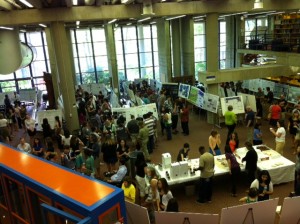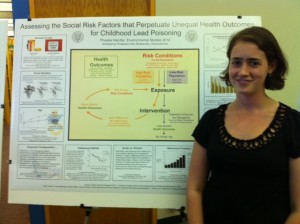I always enjoy attending the annual student Summer Research Poster Session, which is the culmination—and celebration—of a summer’s worth of research in the sciences and social sciences at Wellesley. This event always generates so much excitement and energy, which is infectious!
 On Thursday, I stopped by the Science Center Library and was impressed by the depth and breadth of research presented this year—from a computer science lab that investigated political speech and manipulation on Twitter, to a geosciences lab where a student looked at childhood lead poisoning from a socioeconomic perspective, to a sociology lab that studied the social constructs of bullying, and a chemistry lab working on developing a multipurpose nanoparticle to treat pancreatic cancer.
On Thursday, I stopped by the Science Center Library and was impressed by the depth and breadth of research presented this year—from a computer science lab that investigated political speech and manipulation on Twitter, to a geosciences lab where a student looked at childhood lead poisoning from a socioeconomic perspective, to a sociology lab that studied the social constructs of bullying, and a chemistry lab working on developing a multipurpose nanoparticle to treat pancreatic cancer.
Most of our Summer Research students are Wellesley students, although some come from other colleges. There is also a group of high school students who spent the summer doing research with their Wellesley mentors.
 The scholars I spoke to on Thursday were grateful for the opportunity to spend a summer doing research—to test out a hypothesis that they formed in a class this past year, to get a head start on their upcoming senior thesis, or to determine if a particular field or discipline is really for them. They are all most appreciative of the opportunity to work directly with faculty researchers in an active professional endeavor. One student expressed it this way to me: In a classroom, you feel like a student, but in this summer research program, you feel like a collaborator—you are one.
The scholars I spoke to on Thursday were grateful for the opportunity to spend a summer doing research—to test out a hypothesis that they formed in a class this past year, to get a head start on their upcoming senior thesis, or to determine if a particular field or discipline is really for them. They are all most appreciative of the opportunity to work directly with faculty researchers in an active professional endeavor. One student expressed it this way to me: In a classroom, you feel like a student, but in this summer research program, you feel like a collaborator—you are one.
I was pleased to encounter a number of students who have no intention of majoring or working in a science field. One good example of this is a history major who worked in a chemistry lab this summer on a complex project. Faculty encourage all of our students to try their hand at real research.
The number of students participating in Summer Research at Wellesley has increased tremendously over time. The program has become increasingly competitive, as student interest exceeds capacity. Such opportunities are important for students, and we need to make sure these experiences continue to be available.
I am particularly pleased with the increased interest because I know this program is exactly the right program to help fill the science pipeline for the world and the right kind of program to overcome the stereotypical biases that convince so many capable young women that they can not do science. All of them leave this program knowing that they can.

